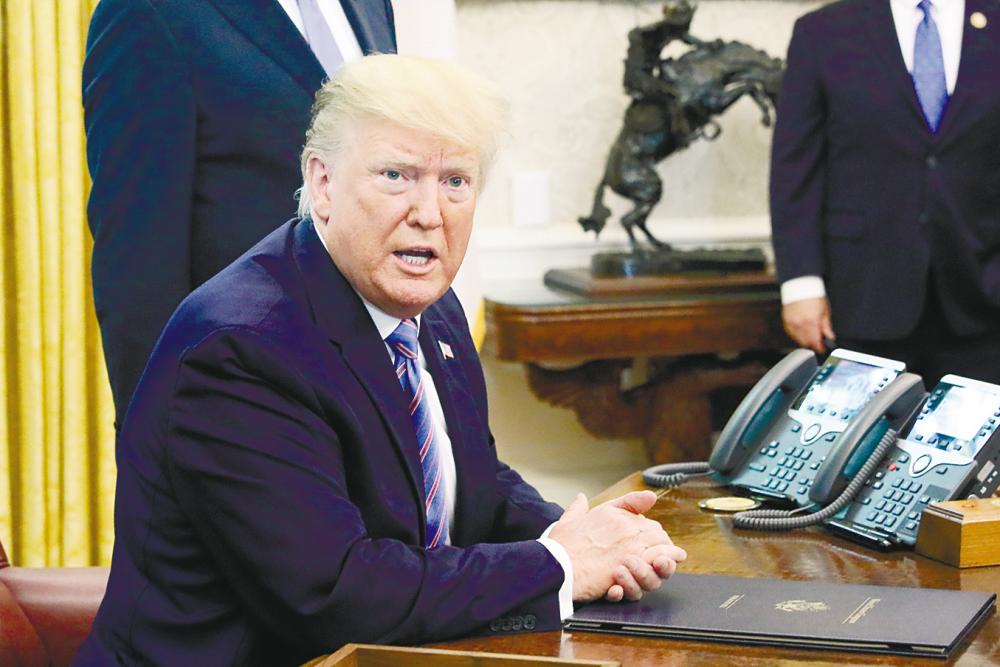THE antics of US President Donald Trump – threatening tariffs on Mexican goods and then yanking the threat nine days later, linking his action to the largely unrelated protection of the southern US border; bragging about his decision to call off an attack against Iran, for shooting down a US drone, 10 minutes before the operation was set to go; and expressing the possibility of upending a 60-year-old defence treaty with Japan – most likely are designed to deflect media and public attention from the spectre of impeachment. Seventy-eight Democrats in the House of Representatives – one-third of the party’s House membership – have called on Speaker Nancy Pelosi to begin formal impeachment proceedings.
This is something no president wants. The claim by some commentators that Trump actually wants to be impeached is preposterous. No president wishes to be lined up alongside Andrew Johnson (impeached in 1868) and Bill Clinton (impeached in 1998) as national leaders who were tried by the Senate for acts amounting to “high crimes and misdemeanours”. Despite the fact that Johnson and Clinton survived Senate trials, they will always be mentioned by historians and civics teachers as the only impeached US presidents – unless they are joined by Trump.
Trump and his team of apologists want Americans to believe that the two-year-long investigation by special prosecutor Robert Mueller was a complete bust, one that exonerated Trump of wrongdoing. But Mueller went public for the first time since his report was released to emphasise what the report clearly stated: Trump and many of his underlings committed plenty of nefarious acts, including numerous and varied attempts to hide the truth about matters related to collusion and obstruction of justice
Perhaps the most revealing finding in the report was the reaction by White House counsel Don McGahn when the president called him, in June 2017, and asked him to fire Mueller. McGahn refused to do so and stated that he feared a “Saturday Night Massacre” could result. He was referring to the 1973 episode in which President Richard Nixon ordered the firing of the special prosecutor investigating the Watergate affair. Nixon’s attorney general and deputy attorney general refused to comply with his order, and both were themselves fired. The incident was instrumental in Nixon’s eventual resignation from office.
Trump himself might very well be facing prosecution at this moment were it not for the controversial Department of Justice (DOJ) opinion, expressed by one man in 1973, that a sitting president cannot be prosecuted (a decision the department reaffirmed in 2000). The DOJ’s Office of Legal Counsel opinion states that “a criminal case against the president would interfere with the president’s unique official duties, most of which cannot be performed by anyone else.” The policy also stems from a belief that since Congress has the power to oversee the president and impeach him if it is warranted, he ought to be constitutionally sheltered from ordinary prosecutions.
This view has long been regarded by many legal experts as creative and subject to a strong court challenge. The policy has been undercut twice by the Supreme Court. In 1973 the court held that a criminal subpoena for information trumps a president’s wish to keep such information secret, and in 1997 it permitted Paula Jones to proceed with her civil case, involving sexual harassment, against Clinton while he was in office.
The Jones decision is especially pertinent: If a president is not too preoccupied with his official duties to defend himself in a civil action, why is he too busy in a criminal action? Moreover, why should the impeachment power of Congress be construed as one that hamstrings prosecutors from proceeding with a case, if one is warranted, anyway? The Constitution requires no such thing.
Throughout his presidency Trump has attempted to change the subject or scandal of the moment by shifting media and public attention to his wild, often unprecedented actions. So this episode is predictably Trump.
Trump’s supporters hope that the administration’s shifty, disreputable behaviour, outlined in the Mueller report, will somehow be forgotten, along with discussions surrounding impeachment. But this is a fantasy.
Mueller is set to testify before Congress on July 17. This is significant because few Americans have read even a portion of his 400-plus page report. By speaking to Congress directly, Trump’s culpability perhaps will be displayed in an uncomplicated way, and might very well spark renewed public interest in holding him to account.
The writer is a professor at HELP University.













